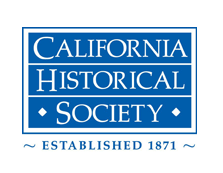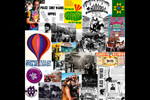Kaliflower and The Free Print Shop
Originally published in the CHS newsletter, 1998.
The California Historical Society is fortunate
to have as one of its manuscript collections an archive of the publication Kaliflower, produced by the Free Print Shop in San Francisco from April
24, 1969, through June 22, 1972. Ms. 4008, The Friends of Perfection,
which was the members' semi-official name when dealing with outside
agencies, is available for research at the North Beach Research Library at
the Society. These archival materials were donated to the Society in 1973
by Irving Rosenthal and Eric Noble. We are grateful to them both for the
beautifully preserved condition and the completeness of the set as they
were donated to us. This year marks the 25th anniversary of this donation
to the Society.
The Free Print Shop grew out of one of the communes in the 1960s in San
Francisco--the Sutter Street Commune. The commune consciously adopted the
Digger Free Philosophy when it was founded in 1967. The Diggers, one of
the groups in San Francisco's Haight-Ashbury District, took their name
from the original English Diggers (1649-50) who had promulgated a vision
of society free from private property and all forms of buying and selling.
The San Francisco Diggers evolved out of and combined elements of the
bohemian arts and underground theater communities as well as the radical
Left political movements that thrived in the San Francisco Bay Area in the
mid-1960s.
The Diggers combined street theater, direct action, and art happenings
in their social agenda of creating a free city. Their most famous
activities revolved around distributing free food every day in Golden Gate
Park and distributing "surplus energy" at a series of free
stores. The Digger events, editorial comments of the day, pronouncements
to the larger "hip" community, manifestos and miscellaneous
communications, were broadcast through broadsides, leaflets and posters
were distributed by hand on Haight Street.
The Sutter Street Commune was set on implementing a blueprint for
action that the Diggers had outlined in 1967. The commune's founder
brought his printing presses to San Francisco in the summer of 1968,
inspired by two fellow Diggers who suggested a free publishing venture.
Over the next several years, the Free Print Shop published a variety of
materials including flyers for other communal groups, for free services,
ecology groups, free arts groups, and the occasional political protest.
In the spring of 1969 the Sutter Street Commune began publishing an
intercommunal newspaper, Kaliflower, named for Kaliyuga, the Hindu name
for the last and most violent age of humankind and the Hindu goddess Kali.
For over three years Kaliflower fulfilled the Digger intent to provide a
free publication for Bay Area communes. At its end there were close to
three hundred communes that were receiving Kaliflower every Thursday.
"Kaliflower Day," as the name by which Thursdays became
known, was an intercommunal ritual. That was the day of the week when
Kaliflower got bound and distributed to all the other communes on the
routing list. In the beginning, each commune that received Kaliflower had
a plywood board with a poster located in the communal space where the
messengers would hand-deliver the Kaliflowers. The California Historical
Society has not only copies of all the original issues of Kaliflower, but
also one of the plywood boards used for delivery. A bamboo tube, attached
to the board, was where any free messages were put waiting for the
deliverer's pick up. Our copies of Kaliflower were donated in an old
Japanese steamer trunk salvaged from a Victorian house in Japantown, where
commune members lived for their first seven years.
Each Kaliflower was printed and bound by hand. The binding used the
Japanese method of yarn overstitched on either the top or side. Every
issue was a different color, and offset printing was the method by which
the issues were printed. Kaliflower became an important mode of
communication among the communes. It was common for people who delivered
Kaliflower to come back with stories of going from one commune to another
and being feted at each in various ways. These messengers would pick up
announcements and free ads that would appear in the next issue. The
California Historical Society also has a complete set of the broadsides,
posters and other printed matter distributed with Kaliflower. In addition,
there are 286 Free Print Shop leaflets on various topics such as
"Free Presidio 27," "Bring Huey Home," "Hells
Angels Party," " The Non-Violent Revolution of India a
Talk," and "Gay Liberation Now."
Eric Noble, one of the donors of the collection, became the unofficial
archivist for the commune and the movement at large. Noble, who still
lives and works in San Francisco, has also created a Web Site devoted to
the Diggers (www.diggers.org) which
has a wealth of information about the Diggers, Kaliflower (from which much
of the above information was taken), and other communes in the Bay Area
during the 1960s and 1970s. The California Historical Society also has
another related manuscript, Ms. 3159, on the Haight Street Diggers, which
is closely related to the above donations and was donated by Noble in
1976.
Copyright © 1998 California Historical Society. All rights
reserved.
|

Logo of the California Historical Society
|

